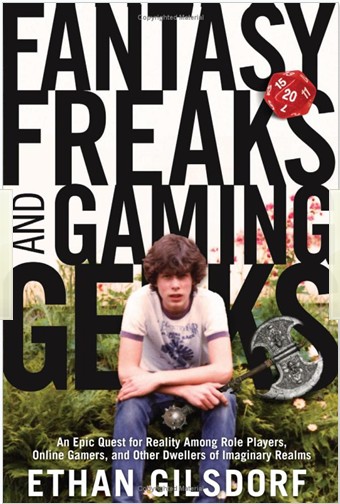Fantasy Freaks and Gaming GeeksEthan Gilsdorf Lyons Press, 2009 $24.95

If we’ve learned anything from Sigmund Freud and J.K. Rowling, it’s that we members of the species homo sapiens sapiens exhibit a strong fantasy life. From the family romance to wingardium leviosa—frame it however you like—our predilection to imagine ourselves as something other than what we are is as old as the first storyteller regaling listeners around a campfire with tales of thrilling hunts, noble deeds or, indeed, anything that takes us out of ourselves and puts us elsewhere.
Ethan Gilsdorf’s Fantasy Freaks and Gaming Geeks is a meditation on this all-too-human fact of life. [Full disclosure: the acquiring editor for Lyons Press, Keith Wallman, is a subscriber to New Haven Review.] Gilsdorf's starting point is personal and, at times, painfully confessional, a saga that prompts his grand tour of the Anglo-American obsession with medieval fantasy and faerie. That obsession ranges from beer-bellied, bearded role play gamers gathered in Geneva, Wisconsin, to relive the pre-corporate glory days of Dungeons & Dragons to middle-aged housewives whacking orcs and ogres in the virtual realms of World of Warcraft. There are middle-class couples who don wings and tunics on weekends to swing Styrofoam swords and fling confetti-filled fireballs at one another, as well as “Tolkien tourists” who descend en masse on the New Zealand of Peter Jackson's Lord of the Rings to walk the grassy plains of Rohan and sniff the cindery ash of Mordor.
Gilsdorf's survey, however, is more than an act of journalism. It is an inner odyssey that gets its first push with the devastating stroke that transforms his mother from a bright, ebullient woman, for whom the world was her middle-class oyster, into the “Monster”: a shambling, chain-smoking, emotionally explosive terror whose son finds solace in a regularly scheduled Dungeons & Dragons game with high school friends. This, at least, is the personal motivation behind Gilsdorf's re-entry into geekdom. Like so many others—myself included—when Gilsdorf left for college, he had put childish things away, supplanting the joys of casting sleep spells and slaying giants with the more mundane adult pursuit of grades, sex, money, work, family. In Fantasy Freaks, Gilsdorf takes the opportunity proffered by authorship and a book contract to revisit this phase of his life and indulge himself. But this indulgence is hardly a shameless one since Gilsdorf is clearly unsettled by the passion with which he returns to his teenage roots.
Mostly it’s a question of image. Anxieties about how he looks to his peers resonate throughout. This explains in part his not infrequent mention of how normal his respective guides through the subcultures of Dungeons and Dragons, World of Warcraft, live action role playing, and DragonCon are. And then there is his own baldly stated yearning for adult things he is without at the time of writing—a long-term relationship, marriage, children. The underlying story of cultural anxiety combines elements of projection (“What’s so weird about pretending I’m a half-elf warrior? The guy who plays the dwarf wizard is an assistant VP of finance at the local bank!”) with reaffirmations of normal urges (“OK, so I’m dressed in a funny costume at this DragonCon, but everyone’s doing it and maybe I’ll meet a girl and have real rather than role play sex”). But Gilsdorf's projections are no different from those of every guy or gal who lives, in one way or another, a Clark Kent-Superman double life; while his reaffirmations have their merits inasmuch as fantasy play can serve as a conduit to culturally normative goals, such as networking for love or money. Looked at squarely, who can argue with either of these? Four guys huddling over funny-shaped dice and stacks of rulebooks, which may end in a shared beer or job lead, is no stranger than watching four guys huddling in a green field over a dimpled white ball that rests on a little piece of wood, which they will spend some three to five hours swatting with one of ten differently shaped, club-footed poles.
Gilsdorf does make several pop psychology efforts to explain the penchant of a certain class of Americans (and Englishmen and Australians and Frenchmen, etc.) for these types of recreations. Much of this pop psy 101 stuff comes from his own intuition. Nor do I think him that far off the mark. These various forms of role play, whether table-top, digital, or “live action,” do reflect our collective need to escape the dullness of our daily reality, supply ourselves with the illusion of control over the chaos of modern life, feed that never absent desire for child-like, consequence-free play, and give release to our pent-up stores of aggression. It is all of these, and more. Indeed, if I had but one criticism to make, it would have been a fond wish for Gilsdorf to have shed some of the habits of personal journalism and donned more academic vestments. (He certainly is capable, as a former Harvard graduate.) In brief, I and, I suspect, any of his readers would have liked to have seen more of the academic literature—assuming there is any—on these various behaviors. Otherwise, Fantasy Freaks is an eye-opening romp through what continues to strike me as a culturally specific juncture in our collective psychology.